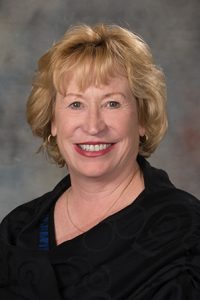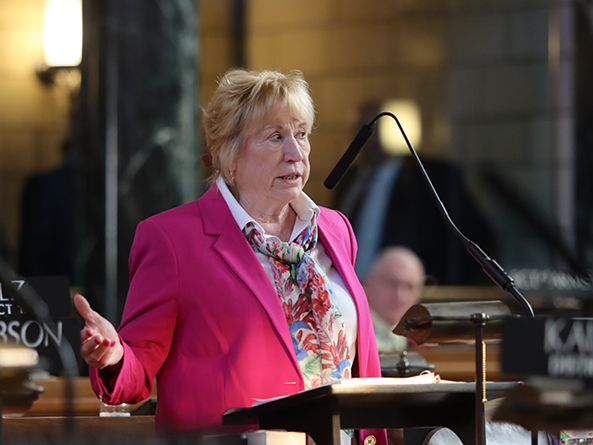Revenue package containing good life district changes advanced
Lawmakers gave first-round approval April 4 to another package of tax-related proposals, including one under which cities could use local tax revenue to pay for the development of special retail districts.

Elkhorn Sen. Lou Ann Linehan, sponsor of LB1317, said it was introduced as a placeholder. A Revenue Committee amendment, adopted 34-0, replaced the bill with 10 other bills heard by the committee this session.
Under the provisions of LB863, introduced by Linehan, an individual no longer could deduct amounts received as annuities under the Federal Employees Retirement System for state income tax purposes.
The amended provisions of LB1043, introduced by Sen. Terrell McKinney of Omaha, would require certain nonprofit organizations that own or acquire underutilized tax-exempt property in a high-poverty area to develop the property within three years.
The nonprofit would be required to submit a development plan for the property to the state Department of Economic Development, the clerk of the Legislature and the chairperson of the Urban Affairs Committee within 90 days.
If the nonprofit fails to develop the property within that period, the department director would impose a fine. The director would revoke the property’s tax exemption if the failure persists for a further two years.
McKinney introduced an amendment, adopted 37-0, that instead would require the director to make a written recommendation to the county board of equalization that the exemption be revoked. The amendment also would prohibit a nonprofit organization from selling the property at a price that is more than 50% above market value.
The amended provisions of LB1093, sponsored by Lincoln Sen. Eliot Bostar, would update the First Responder Recruitment and Retention Act, which provides tuition assistance to qualifying first responders.
The amendment would expand and clarify the definition of first responder to include any law enforcement officer and professional firefighter.
It also would, with certain exceptions, prohibit an employer from canceling a first responder’s individual or family health insurance policy if the first responder suffers serious bodily injury from an event that occurs while the first responder is acting in the line of duty.
If a first responder dies as a result of such an event, the employer could not cancel any health insurance policy covering the first responder’s spouse or dependent for at least 12 months.
Currently, interest on refunds and additional taxes due as a result of a decision on a property’s valuation by the Tax Equalization and Review Commission begins to accrue on the date of the decision.
Under the amended provisions of LB1134, introduced by Sen. R. Brad von Gillern of Elkhorn, interest would begin to accrue 30 days after the decision. The amendment also would allow two commissioners to constitute a quorum to hear and determine appeals or petitions.
The amended provisions of LB1217, sponsored by Bostar, would update requirements for owners of rent-restricted housing projects and change how county assessors calculate valuation for those projects.
Bostar said the changes would correct “flaws” in currently required valuation methods that have resulted in zero or negative valuations on certain rent-restricted housing projects.
The amendment also would allow the owner of a sales-restricted house to apply to the county assessor for a special valuation. The assessor would determine the house’s value at its unrestricted appraised value and its maximum allowed sale price and then use the lesser of the two values to determine its valuation.
Under the amendment, certain nursing and assisted-living facilities would receive a property tax exemption based on the percentage of occupied beds provided to Medicaid beneficiaries. It also would apply a property tax exemption to the commons area of a building that is owned by a charitable organization and used for student housing.
The amended provisions of LB1218, introduced by Bostar, would impose an excise tax of 3 cents per kilowatt hour on the electricity used to charge electric and plug-in hybrid electric vehicles at a commercial electric vehicle charging station, beginning Jan. 1, 2028.
The amendment also would increase the additional registration fee for each motor vehicle powered by an alternative fuel from $75 to $150. The additional fee for a plug-in hybrid electric vehicle would be $75.
Under the amendment, an electric supplier could own, maintain and operate a direct-current, fast-charging station for retail services only at a location that is at least 15 miles from a privately owned station and at least one mile from a federally designated alternative fuel corridor.
Before beginning construction of a fast-charging station, an electric supplier would have to conduct a right of first refusal process.
The electric supplier would provide public notice at least 90 days prior to beginning construction and could not build if a private charging station operator asserts their right of first refusal by providing notice that the operator plans to provide a station within 15 miles of the proposed location.
If no operator asserts their right within the 90-day period or if no station is built within 18 months after an operator provides notice, the electric supplier could proceed with construction.
Several senators said the requirement would unfairly restrict public power utilities.
Niobrara Sen. Barry DeKay said it would not be “proper” to prohibit utilities from participating in their core business of selling electricity to customers. He said he would seek to remove the right of first refusal provision on the second round of debate.
Sen. Mike Jacobson of North Platte said the process would ensure that private retailers who invest in expensive fast charging equipment would not have to compete with public utilities that can subsidize charging stations with ratepayer funds.
The provisions of LB1295, sponsored by von Gillern, would create the Financial Institution Data Match Act. The measure would require the state Department of Revenue to operate a data match system with each financial institution doing business in Nebraska.
Under the system, the department would provide financial institutions a list of individuals with unpaid taxes that the institutions would match to their account records. Institutions would provide the department with a list of all matches that includes the name, address and Social Security number or federal employer identification number of each tax debtor that is matched and the balance of each account.
Financial institutions could charge the department a fee to cover the cost of reporting matches, and the department could contract with vendors to develop the system and perform matches. Financial institutions, the department and vendors would be subject to information security and confidentiality requirements.
The amendment would require the state tax commissioner to submit an annual report to the Revenue and Appropriations committees on the amount of taxes, penalties and interest collected during the most recently completed fiscal year as a result of contracts entered into with vendors.
The Legislature last session passed the Good Life Transformational Projects Act, which authorizes the state Department of Economic Development to approve applications for “good life districts” that meet certain thresholds related to investment and job creation. Transactions within a district are subject to a reduced state sales tax rate of 2.75%.
Under the provisions of LB1374, introduced by Linehan, a city could — with voter approval — establish an economic development program for an area of the city included in a good life district and appropriate local sources of revenue to pay for certain development costs, including the construction of public and privately owned real estate.
A city also would be authorized to finance a program by issuing bonds that would be payable from the local sources of revenue.
The provisions of LB1389, sponsored by Bostar, would exempt broadband equipment from personal property tax if it is deployed in an area using federal Broadband Equity, Access and Deployment Program funds or in a qualified census tract located in a metropolitan class city and used to provide internet access at certain speeds.
The provisions of LB1397, introduced by Glenvil Sen. Dave Murman, would exclude land used for commercial purposes that are not agricultural or horticultural — such as land used for a solar farm or wind farm — from the definition of agricultural and horticultural land for valuation purposes.
Finally, the amendment contains provisions of Bostar’s LB1184 stating legislative intent to appropriate $1 million in general funds for fiscal year 2024-25 to the state Department of Environment and Energy to fund the installation of real-time nitrate sensors in monitoring wells.
Sen. Robert Clements of Elmwood introduced an amendment, adopted 31-0, that he said would improve the accuracy of currently required reports on inheritance tax collected by counties.
Sumner Sen. Teresa Ibach introduced an amendment, adopted 31-0, to include provisions of her LB893.
Under the amendment, business equipment involved in the manufacturing or processing of liquid fertilizer or any other chemical applied to crops — or the manufacturing of any liquid additive for a farm vehicle fuel — would qualify for a property tax exemption under the ImagiNE Nebraska Act.
Linehan introduced an amendment, adopted 33-0, to create a collection system she said would intercept an individual’s gambling winnings to pay off any child support debts or unpaid taxes.
The proposal would require an authorized gaming operator or licensee, before making a winnings payment, to check the system to determine if the winner has a debt for child support or medical or spousal support or an outstanding state tax liability.
The operator would deduct that amount from the winnings and remit the net winnings payment to the winner and the deducted amount to the state Department of Revenue, which would operate the system. The department would credit any winnings payment against debt certified by the state Department of Health and Human Services until it is paid off and then against any outstanding state tax liability.
LB1317 advanced to select file on a vote of 37-0.


